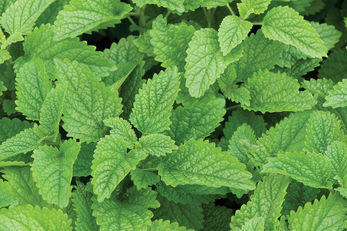6 surprising benefits of lemon balm

Lemon balm, or Melissa officinalis, is a perennial plant from the mint family. Like mint, it can become invasive, but if you like having a multi-purpose medicinal herb at your fingertips, there’s no such thing as too much lemon balm.
Lemon balm is used in many ways, as a tea, an extract, in topical application, and the essential oil is widely used in aromatherapy. The softly refreshing scent of lemon balm is both relaxing and uplifting at the same time.
Unexpected benefits of lemon balm you don't want to miss
- Sleep disorders are a problem for 50 to 70 million Americans. While there are many pharmaceutical solutions, the cost and unwanted side effects are a big turn off, for many people. Conversely, using lemon balm extract as a supplement can help to reduce the anxiety and stress related to chronic insomnia as well as improving sleep quality.
- Boost your immune system with lemon balm. The herb contains powerful antibacterial compounds that help strengthen immunity to protect against common and even dangerous pathogens. Lemon balm is rich in antioxidants that fight against oxidative stress, a cause of cellular damage.
- Lemon balm’s popularity in skin-care products is well-founded. In fact, the antioxidants and polyphenols in lemon balm naturally protect skin from signs of aging and its anti-inflammatory compounds can actually help to improve inflammation-related skin issues.
- When administered in specific concentrations, lemon balm can help to lower triglyceride levels and improve heart health, as well.
- Who knew something as simple as a cup of tea could protect brain health? The high levels of antioxidants in lemon balm reduce plaque in neural pathways and protect against neurodegenerative diseases.
- Cold sores caused by virus may be reduced by the application of lemon balm. The anti-inflammatory and antibacterial compounds in the herb provide natural relief to the discomfort associated with cold sores.
Are you getting the most benefits from lemon balm?
Because lemon balm is so versatile and can be used in many ways, it’s important to understand which method is best for your specific needs. For balancing mood or enhancing sleep, try wearing the essential oil as a perfume or placing a few drops in an aromatherapy diffuser.
Drinking a cup of hot or iced lemon balm tea is a tasty way to get the nutritional benefits of the plant. Simply brew it as you would any other type of herbal tea. The fresh plant has a light lemony flavor and can be used in any dish where you might use fresh mint, such as fruit salads, marinades and desserts.
Lemon balm essential oil, extract or infusion make topical application easy. Never apply essential oil straight to the skin, dilute a few drops in a carrier oil or into your favorite cream/lotion instead. Topical applications are helpful for reducing inflammation, pain and supporting skin complexion care.
Sources for this article include:
- acetic acid
- actinidin
- adaptogenic herbs
- adequate fluid intake
- ala
- allicin
- allium vegetables
- alpha-linolenic acid
- Alzheimer’s disease
- amaranth
- amino acids
- ancient grains
- anemia
- anthocyanidins
- anthocyanins
- anti-aging
- anti-inflammatory
- anti-inflammatory fats
- anti-obesity effects of hummus
- antidepressant herbs
- antioxidant spices
- antioxidants
- antioxidants in prunes
- apigenin
- armenian plums
- aromatherapy
- ashwagandha
- astaxanthin for eye health
- bcaas
- benefits of ancient grains
- benefits of apples
- benefits of apricots
- benefits of artichokes
- benefits of asparagus
- benefits of astaxanthin
- benefits of balsamic vinegar
- benefits of bananas
- benefits of beets
- benefits of black pepper
- benefits of blackberries
- benefits of brazil nuts
- benefits of cabbage
- benefits of cantaloupe
- benefits of capers
- benefits of caraway seeds
- benefits of carnitine
- benefits of cashew nuts
- benefits of cauliflower
- benefits of cilantro
- benefits of cinnamon
- benefits of coconut water
- benefits of colloidal oatmeal
- benefits of coq10
- benefits of cottage cheese
- benefits of cranberries
- benefits of cucumbers
- benefits of dandelion greens
- benefits of dates
- benefits of epa and dha
- benefits of farro
- benefits of flaxseed oil
- benefits of garcinia cambogia
- benefits of garlic
- benefits of grapes
- benefits of guava
- benefits of hemp seeds
- benefits of holy basil
- benefits of honey
- benefits of hot honey
- benefits of hummus
- benefits of iron
- benefits of jicama
- benefits of kiwi fruit
- benefits of kiwifruit
- benefits of lemon water
- benefits of leucine
- benefits of lychees
- benefits of magnesium
- benefits of manganese
- benefits of manzanilla olives
- benefits of miso soup
- benefits of neroli oil
- benefits of onions
- benefits of oregano
- benefits of parsnips
- benefits of passionflower
- benefits of peaches
- benefits of pecans
- benefits of peppermint
- benefits of phosphorus
- benefits of pistachio nuts
- benefits of plantains
- benefits of pomegranate
- benefits of prunes
- benefits of pumpkin
- benefits of raisins
- benefits of red wine vinegar
- benefits of rhodiola
- benefits of rutabaga
- benefits of scallops
- benefits of shallots
- benefits of squash
- benefits of star fruit
- benefits of strawberries
- benefits of sunflower seeds
- benefits of sweet potatoes
- benefits of swiss chard
- benefits of tangerines
- benefits of tart cherry juice
- benefits of taurine
- benefits of thyme
- benefits of tofu
- benefits of wakame seaweed
- benefits of yams
- benefits of yellow dock
- benefits of zinc
- bergamot essential oil
- beta-carotene
- beta-glucan
- betalains
- black beans
- black pepper
- blood pressure
- blood sugar
- blood sugar control
- bone health
- bone-building minerals
- bone-building vitamins and minerals
- brain health
- branched chain amino acids
- broccoli
- bulletproof coffee
- burdock root
- cancer
- cannabinoids
- capsaicin
- cardiovascular health
- carotenoids
- carrots
- carvacrol and thymol
- carvone
- casein
- cassia cinnamon
- cauliflower nutrition
- cbd
- ceylon cinnamon
- chickpeas
- chili peppers
- chives
- chlorogenic acid
- chronic stress
- cinnemaldehyde
- citrus essential oils
- citrus fruits
- co-enzyme q10
- coconut water
- cognitive function
- cognitive health
- constipation
- copper
- coriander
- cranberry juice
- cruciferous vegetables
- dandelion greens
- depression
- detoxification
- dietary fiber
- dietary zinc
- digestive benefits of ginger
- digestive health
- diosgenin
- dried fruits
- ease anxiety
- eczema
- edible sea vegetables
- electrolytes
- enhance physical performance
- essential minerals
- essential oils
- essential trace minerals
- farro nutrition
- fatigue
- fatty liver disease
- fiber
- fisetin
- fish oil
- flavonoids
- folate
- foods for brain health
- foods rich in CoQ10
- foods with tryptophan
- french maritime pine bark extract
- gaba
- gingerols
- ginkgo biloba
- glucosinolates
- glutathione
- green tea
- greens
- gut bacteria
- gut health
- gut microbiome
- H. pylori bacteria
- health benefits
- healthy Asian cuisine
- healthy beverages
- healthy blood sugar
- healthy condiments
- healthy diet
- healthy digestion
- healthy dried fruits
- healthy fats
- healthy fruits
- healthy iron levels
- healthy root vegetables
- healthy seasonings
- healthy snacks
- healthy spices
- healthy sweeteners
- healthy weight
- heart disease
- heart failure
- heart health
- herb
- herbal antidepressants
- herbal headache relief
- herbal healing
- herbal teas
- herbs and seasonings
- herbs for anxiety
- herbs for memory
- hesperidin
- hesperidin and naringenin
- heterocyclic amines
- hibiscus tea
- high oxalate foods
- homocysteine
- hypothyroidism
- immune support
- immune system function
- inflammation
- insoluble fiber
- inulin
- iodine
- iron deficiency anemia
- iron-rich foods
- kidney stones
- LDL cholesterol
- leafy greens
- leeks
- lemon oil
- lemon water
- limonene
- liver health
- liver-cleansing herbs
- longevity
- lower blood pressure
- lutein and zeaxanthin
- luteolin
- lychee fruit
- lycopene
- macular degeneration
- magnesium
- magnesium-rich foods
- mandarin oranges
- manuka honey
- mct benefits
- Mediterranean diet
- medium-chain triglycerides
- melatonin
- menthol
- microgreens
- mild cognitive impairment
- mindful eating
- minerals
- minerals and vitamins
- minerals for bone health
- monounsaturated fats
- mood-lifting foods
- mood-lifting herbs
- muscle building foods
- muscle growth
- nafld
- naringenin
- natural antidepressants
- natural anxiety relief
- natural beauty
- natural blood sugar control
- natural constipation relief
- natural insect repellent
- natural mood elevators
- natural nutrients
- natural pain relief
- natural skin care
- natural skincare
- natural techniques for anxiety
- natural treatments for nausea
- natural weight control
- natural weight loss
- nitric oxide
- nutritious small meals
- nuts and seeds
- oatmeal
- oatmeal baths
- obesity
- oleic acid
- oleuropein
- omega-3 fatty acids
- omega-3s
- opcs
- orange oil
- oregano essential oil
- organosulfur compounds
- osteoporosis
- parsley
- peppermint essential oil
- piperine
- piperonal
- plant-based protein
- pomegranate seeds
- post-exercise soreness
- post-workout recovery
- potassium
- prebiotic fiber
- prebiotic foods
- prebiotics
- proanthocyanidins
- probiotic foods
- probiotics
- proper hydration
- protect vision
- pumpkin seeds
- punicic acid
- quercetin
- quinoa
- raisin nutrition
- relaxing herbs
- resistant starch
- restful sleep
- resveratrol
- rhodiola
- root vegetables
- sage
- salt substitutes
- seafood
- selenium
- shellfish
- silymarin
- skin health
- soluble fiber
- statin side effects
- sulforaphane
- superoxide dismutase
- sweet potatoes
- swiss chard
- tarragon
- teff
- the fines herbes
- thymol
- tree nuts
- tropical fruits
- tulsi
- type 2 diabetes
- ubiquinone
- urinary tract infections
- vegetable
- vitamin
- vitamin A
- vitamin C
- vitamin K
- vitamin k1
- wakame seaweed
- whole grains
- workout recovery
- wound healing
- zinc






